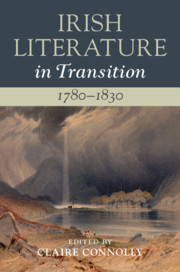Book contents
- Irish Literature in Transition, 1780–1830
- Irish Literature in Transition
- Irish Literature in Transition, 1780–1830
- Copyright page
- Contents
- Contributors
- Series Preface
- General Acknowledgements
- Acknowledgements
- Introduction
- Part I Origins
- Chapter 1 Gaelic Literature in Transition, 1780–1830
- Chapter 2 Irish Literature and Classical Modes
- Part II Transitions
- Part III Reputations
- Part IV Futures
- Index
Chapter 2 - Irish Literature and Classical Modes
from Part I - Origins
Published online by Cambridge University Press: 28 February 2020
- Irish Literature in Transition, 1780–1830
- Irish Literature in Transition
- Irish Literature in Transition, 1780–1830
- Copyright page
- Contents
- Contributors
- Series Preface
- General Acknowledgements
- Acknowledgements
- Introduction
- Part I Origins
- Chapter 1 Gaelic Literature in Transition, 1780–1830
- Chapter 2 Irish Literature and Classical Modes
- Part II Transitions
- Part III Reputations
- Part IV Futures
- Index
Summary
Classicism and classical allusion provided writers of the period with a time-honoured way of thinking about personal and political life. Fragments of classical story survived in popular culture and there was a tradition of gentry classicism, typified by Burke’s appropriation of the classical sublime, signifying expensive education perhaps supplemented by travel. Artists, sculptors, and architects who might have studied in Rome could supplement and stimulate textual appropriations with visual representations of classical myth, heroism, and civic or senatorial dignity. Patriotic antiquarianism, both exploited and mocked by Thomas Moore, selected possible references to the antiquity, civility, and fortitude of Ireland from classical sources. Poets of both sexes elegantly imitated classical praise of love and wine. But gentry classicism was gradually extended and democratised, sometimes sharpening into quasi-Juvenalian satire, through growing awareness and deployment of classically derived discourses of rights and liberty. Moore’s mellifluous Anacreon versions were followed by the more national Irish Melodies.
Information
- Type
- Chapter
- Information
- Irish Literature in Transition, 1780–1830 , pp. 52 - 66Publisher: Cambridge University PressPrint publication year: 2020
